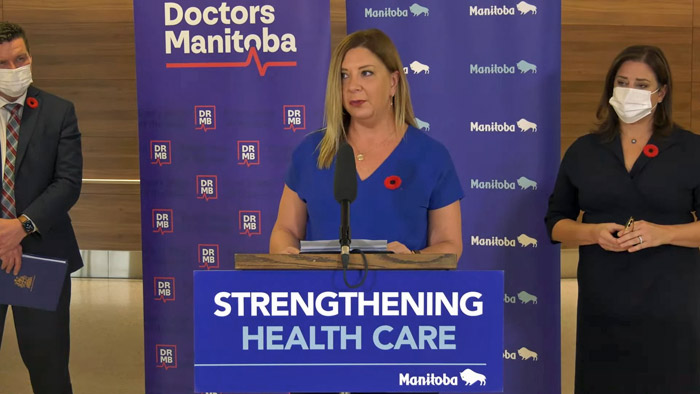The Manitoba government is helping heal the health-care system by launching a new premium for physicians who offer extended hours in family medicine and pediatric clinics, adding 80 physician-training seats, and providing mental-health supports to doctors.
“Our government is making significant investments to heal health care and we know that physicians will be essential in that healing process,” said Health Minister Audrey Gordon. “We recognize the enormous contributions of primary-care providers and pediatricians and the care they provide to Manitobans. Providing an incentive to extend clinic hours will make accessing care more convenient and timely, while taking pressure off emergency departments and urgent care centres so the health-care system functions more efficiently overall.”
Gordon noted the changes announced today fulfil promises laid out in the Health Human Resource Action Plan.
Effective Feb. 1, family medicine and pediatric clinics offering extended hours can receive a 20 per cent premium on extended hour billings. This change will help ensure primary-care providers and pediatricians are readily available, Gordon noted. Eligible extended hours, which can be used to see existing patients or take walk-ins, are considered weekdays from 6 a.m. to 8 a.m. and 5 p.m. to midnight, and weekends and recognized holidays from 7 a.m. to midnight.
Participating clinics have been asked to advertise or promote extended hours and availability, Gordon said, adding that the Manitoba government will work with Doctors Manitoba to ensure the new premium will help increase overall capacity in the health-care system.
“The actions the government is announcing today all directly respond to advice we’ve offered on behalf of physicians,” said Dr. Candace Bradshaw, president, Doctors Manitoba. “From an innovative and unique-in-Canada approach to help clinics with extending their hours, to a significant expansion in medical training, to new resources for supporting physician wellness and avoiding burnout, all three of these actions will help to support better access to medical care for Manitobans.”
The Manitoba government will also provide funding for 40 new undergraduate physician-training seats, a 10-seat increase in the one-year international medical graduate program and 30 seats in the two-year postgraduate medical education program for internationally educated medical students.
“This is an incredible opportunity for Manitoba, so prospective physicians can find a place to learn and grow in their chosen career path in the province,” said Advanced Education and Training Minister Sarah Guillemard. “The Manitoba government will be investing in the education of those who will provide care to Manitobans for years into the future, recognizing that our workforce needs to attract students from Manitoba, across the country and around the world. This work will also support the overall goal of adding 2,000 health-care providers as part of our government’s Health Human Resource Action Plan.”
This funding will ensure access to undergraduate medical education programs will keep pace with Manitoba’s population growth, while supporting a sustainable and growing number of physician graduates able to work in the province’s health-care system, Guillemard added.
Additionally, the Manitoba government is investing in physician retention by supporting overall physician health and wellness through a $450,000 contribution to the Physician Peer Support program run by Doctors Manitoba. The program offers peer support networks and training for peer supporters, as the support of colleagues has been shown to improve overall wellness and help reduce the risk of burnout. This funding will help ensure the program can continue and expand to meet the changing needs of physicians, the ministers noted, as recommended at a rural and northern summit hosted by Doctors Manitoba and the Manitoba Chambers of Commerce last fall.
These investments are part of the Manitoba government’s Health Human Resource Action Plan, a $200-million initiative announced in November 2022 to help retain, train and recruit 2,000 health-care workers.


